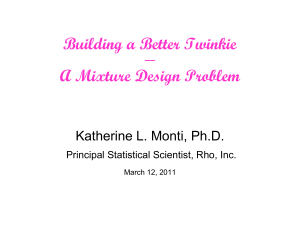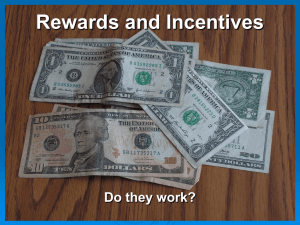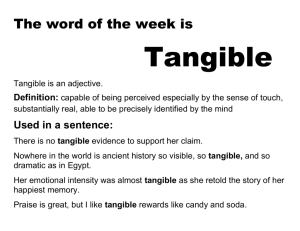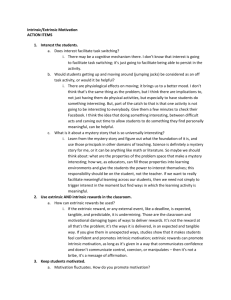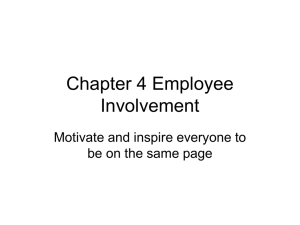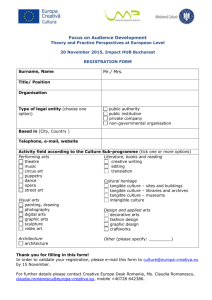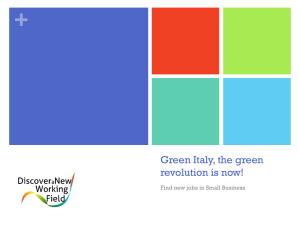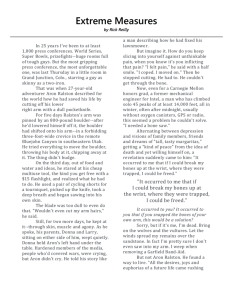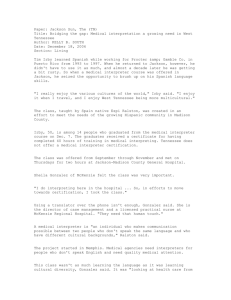Spotlight on Terminology and Language – ESL Pointers
advertisement
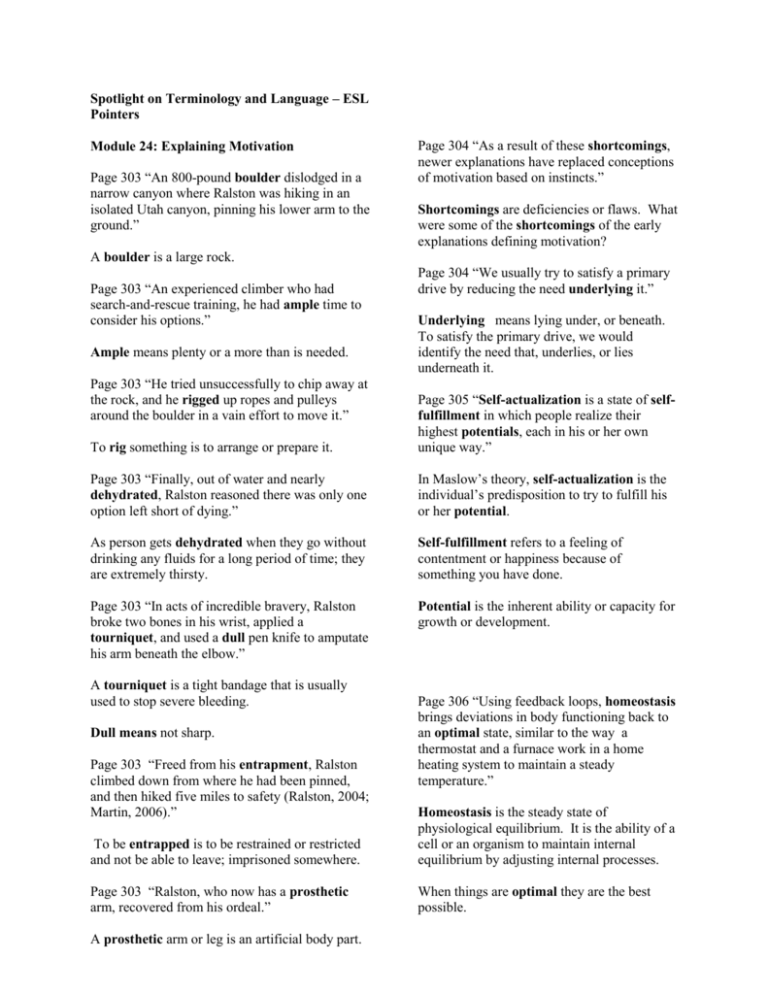
Spotlight on Terminology and Language – ESL Pointers Module 24: Explaining Motivation Page 303 “An 800-pound boulder dislodged in a narrow canyon where Ralston was hiking in an isolated Utah canyon, pinning his lower arm to the ground.” Page 304 “As a result of these shortcomings, newer explanations have replaced conceptions of motivation based on instincts.” Shortcomings are deficiencies or flaws. What were some of the shortcomings of the early explanations defining motivation? A boulder is a large rock. Page 303 “An experienced climber who had search-and-rescue training, he had ample time to consider his options.” Ample means plenty or a more than is needed. Page 303 “He tried unsuccessfully to chip away at the rock, and he rigged up ropes and pulleys around the boulder in a vain effort to move it.” Page 304 “We usually try to satisfy a primary drive by reducing the need underlying it.” Underlying means lying under, or beneath. To satisfy the primary drive, we would identify the need that, underlies, or lies underneath it. To rig something is to arrange or prepare it. Page 305 “Self-actualization is a state of selffulfillment in which people realize their highest potentials, each in his or her own unique way.” Page 303 “Finally, out of water and nearly dehydrated, Ralston reasoned there was only one option left short of dying.” In Maslow’s theory, self-actualization is the individual’s predisposition to try to fulfill his or her potential. As person gets dehydrated when they go without drinking any fluids for a long period of time; they are extremely thirsty. Self-fulfillment refers to a feeling of contentment or happiness because of something you have done. Page 303 “In acts of incredible bravery, Ralston broke two bones in his wrist, applied a tourniquet, and used a dull pen knife to amputate his arm beneath the elbow.” Potential is the inherent ability or capacity for growth or development. A tourniquet is a tight bandage that is usually used to stop severe bleeding. Dull means not sharp. Page 303 “Freed from his entrapment, Ralston climbed down from where he had been pinned, and then hiked five miles to safety (Ralston, 2004; Martin, 2006).” Page 306 “Using feedback loops, homeostasis brings deviations in body functioning back to an optimal state, similar to the way a thermostat and a furnace work in a home heating system to maintain a steady temperature.” To be entrapped is to be restrained or restricted and not be able to leave; imprisoned somewhere. Homeostasis is the steady state of physiological equilibrium. It is the ability of a cell or an organism to maintain internal equilibrium by adjusting internal processes. Page 303 “Ralston, who now has a prosthetic arm, recovered from his ordeal.” When things are optimal they are the best possible. A prosthetic arm or leg is an artificial body part. Page 306 “Many fundamental needs, including the needs for food, water, stable body temperature, and sleep, operate via homeostasis (Canteras, 2002; Machado, Suchecki, & Tufik, 2005).” When something is fundamental it is a basic or essential part. Page 306 “For instance, some behaviors seem to be motivated by nothing more than curiosity, such as rushing to check e-mail messages.” Curiosity is inquisitiveness or interest or a desire to know about something. Page 306 “Both curiosity and thrill-seeking behavior, then, shed doubt on drive-reduction approaches as a complete explanation for motivation.” When something or someone sheds doubt on something they are unconvinced or uncertain about it. Page 307 “For example, people who participate in daredevil sports, high-stakes gamblers, and criminals who pull off high-risk robberies may be exhibiting a particularly high need for arousal Zuckerman & Kuhlman, 2000; Zuckerman, 2002; Cavenett & Nixon, 2006 see Figure 2).” A daredevil is someone who takes high risks; they are carefree and have little regard for danger. A high-stakes gambler is someone who takes extreme risks while playing cards for money. Page 307 “When a luscious dessert appears on the table after a filling meal, its appeal has little or nothing to do with internal drives or the maintenance of arousal.” A luscious desert is one that has a rich, sweet taste. Page 307 “Incentive approaches to motivation suggest that motivation stems from the desire to obtain valued external goals, or incentives.” An incentive is something that stimulates. Can both the fear of punishment and the expectation of reward be an incentive? What incentives do you find are the most effective in motivating you to set time aside for studying? Page 307 “Although the theory explains why we may succumb to an incentive (such as a mouthwatering dessert) even though we lack internal cues (such as hunger), it does not provide a complete explanation of motivation, because organisms sometimes seek to fulfill needs even when incentives are not apparent.” When a person succumbs, they yield to an overwhelming desire or overpowering force. Page 307 “Consequently, many psychologists believe that the internal drives proposed by drive-reduction theory work in tandem with the external incentives of incentive theory to ‘push’ and ‘pull’ behavior, respectively.” To work in tandem with one another is to work in partnership or cooperation Page 309 “Intrinsic motivation causes us to participate in an activity for our own enjoyment rather than for any concrete, tangible reward that it will bring us.” Intrinsic motivation is the inner drive that motivates people in the absence of external reward or punishment. What are some of your activities that are intrinsically motivated? A tangible reward is something able to be perceived as materially existent. When you receive money for your efforts, you receive a tangible reward. Page 309 “In contrast, extrinsic motivation causes us to do something for money, a grade, or some other concrete, tangible reward.” Extrinsic motivation is the desire to engage in an activity for money, recognition, or other tangible benefits. Describe some examples of how your educational institution helps to motivate you both intrinsically and extrinsically. Page 309 “We are more apt to persevere, work harder, and produce work of higher quality when motivation for a task is intrinsic rather than extrinsic.” To persevere is to persist, or continue to do something, typically for a long period of time. Page 305 “For example, a student who reaches his academic potential and graduates with honours while working midnights at an automotive plant to support his family, a teacher who year after year creates an environment that maximizes students’ opportunities for success, and an athlete such as Joannie Rochette who realizes her Olympic dream all may be self-actualized. To maximize potential is to increase potential. Page 309 “Actually, many of the approaches are complementary, rather than contradictory.” Complement means something that completes or brings to perfection, such as the several theories of motivation are complementary, and provide a more complete analysis and understanding of motivation. Be cautious not to confuse this with “compliment,” which means an expression of courtesy or praise, such as the professor paid the entire class a compliment on the quality of the grades they had earned on the exam. When you contradict something, you express or assert the opposite of a statement. A contradiction is an inconsistency or discrepancy.
